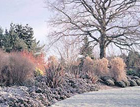Gardening tips for late December
The Christmas break is a time to sharpen secateurs, prune shrubby herbs such as rosemary, plant hedges and feed the birds


Exquisite houses, the beauty of Nature, and how to get the most from your life, straight to your inbox.
You are now subscribed
Your newsletter sign-up was successful
Sharpen secateurs
I can’t count how many times a day I use my secateurs, to cut everything from branches to damaged roots, so it’s vital to keep them sharp. Those made by Felco take a lot of beating, and you can return them to the makers for servicing or do it yourself with their kits of blades, springs and nuts and bolts, so they’ll last for many years. If you’re cutting close to the ground in herbaceous borders, they can soon lose their edge, so sharpen them again before using on fruit trees or roses. A good, lightweight sharpener, easy to keep in your pocket, is the Swiss Istor (available from Lakeland or LBS Garden Ware-house). It’s very useful around the house, too, and would make a welcome Christmas present.
Prune shrubby herbs
Be careful when pruning your evergreens hard frost may damage the exposed bark. Not everything can be left until the spring. Shrubby herbs, such as rosemary, sage and bay, are quite resilient and will regrow next spring after pruning. Hang bunches of the clippings upside down in a warm place to have a supply for cooking over the winter.
Plant hedges
Most gardens need hedges as protection, divisions or boundaries, but hedges have an added benefit for gardeners, as they offer nesting sites to birds and insects. Get your bare-root thorns, beech and privet from specialist growers or garden centres (see the small ads in garden magazines); they’ll be cheaper than the pot-grown ones. For a dense boundary, plant mixed species in twin rows at a distance of 1ft, and with 18in between each tree. Beech, keeping many of its leaves in winter, offers wind protection; plant in the same way, but with only 1ft between them each way. Hazel, if pruned every year, will supply you with plentiful pea and bean sticks. For something different, try the turkey oak (Quercus cerris); it will make a large hedge, as it grows vigorously. If you treat it like beech and cut it in late August, it will keep its brown autumn leaves through the winter.
Feed the birds
Exquisite houses, the beauty of Nature, and how to get the most from your life, straight to your inbox.
Birds play an important part in an organic garden during spring and summer, as they eat huge numbers of caterpillars, slugs and snails. Feed them during the winter to repay them for their work. Keep bird feeders filled with peanuts and sunflower and other mixed seeds. Make sure they are constantly topped up and that the birds have a supply of fresh water, too. Continue feeding in the spring to tempt the birds to nest in your garden. Bird boxes make good Christmas presents for old and young but do make sure they’re fixed outdoors before Valentine’s Day.
Decorate with holly
Natural, rather than artificial, leaves look best for Christmas decorations, but you won’t get holly berries at this time unless the weather conditions are right if there’s a cold snap, the birds will take the berries. So cut a few sprays with berries now, put them in water and keep them in a cold greenhouse until you need them but beware of damage from mice.
Country Life is unlike any other magazine: the only glossy weekly on the newsstand and the only magazine that has been guest-edited by His Majesty The King not once, but twice. It is a celebration of modern rural life and all its diverse joys and pleasures — that was first published in Queen Victoria's Diamond Jubilee year. Our eclectic mixture of witty and informative content — from the most up-to-date property news and commentary and a coveted glimpse inside some of the UK's best houses and gardens, to gardening, the arts and interior design, written by experts in their field — still cannot be found in print or online, anywhere else.
